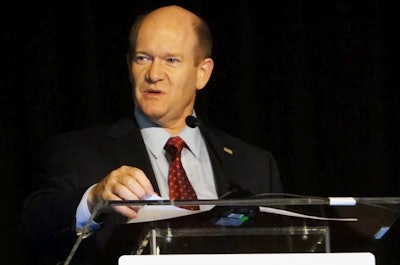
One of the chicken industry’s biggest supporters in Washington said he’s looking at two key trade issues affecting poultry: China and the U.S. Mexico Canada Agreement.
As part of the National Chicken Council’s 65th Annual Conference, Sen. Chris Coons, D-Delaware, spoke about his work with the Senate’s chicken caucus, the ongoing trade dispute with China and the pending ratification of the new trilateral agreement. He appeared on October 30, 2019.
Chicken caucus
Coons is a co-founder of the Senate Chicken Caucus, a group of 13 senators representing 10 states with significant poultry operations. His partner in leadership, U.S. Sen. Johnny Isakson, R-Georgia, is retiring from the Senate at the end of 2019.
Coons said the pair worked closely and traveled regularly to advocate and negotiate on behalf of the industry. The pair represent the largest poultry producing county, Sussex County, Delaware, and the largest poultry producing state in the country.
The caucus convenes regularly to discuss national and international issues facing the poultry industry. He said it recently sent a letter to the U.S. Trade Representative's office, urging them to seek an end to China’s ban on importation of U.S. poultry products. Coons commented on two specific trade issues relevant to poultry the: U.S. Mexico Canada Agreement (USMCA), also called the new NAFTA, and the on-going trade dispute with China.
China
Coons supports the administration for taking on China's trade practices, but he is concerned with how President Donald Trump is prosecuting the so-called trade war. The current tactic of tit-for-tat tariffs is not just affecting China, he said.
“It’s ultimately been bad for a lot of our workers and a lot of our companies and a lot of our consumers,” Coons said. “Despite characterizing this as something only China is paying for, the cost of these tariffs are steadily mounting in terms of the actual impact on U.S. producers and consumers.”
Coons has introduced a bill to lessen the sting of tariffs and reduce the disruption and dislocation of supply chain caused by them. He urges the administration to find a resolution with China that holds the country accountable for its past practices and helps to level the global playing field.
A recent announcement of a tentative deal with China is encouraging, especially for the chicken industry. If the ban on imports is lifted, it would be a good market for U.S. goods. However, the threat remains China will put out of a deal at the last minute.
In the longer term, Coons thinks the market pressure of African swine fever (ASF) and the political pressure of hungry people will force China to deal. The president could also be motivated to make even a short-term deal as a political win for his base of farmer support.
USMCA
As for the USMCA, the trade agreement is signed by the three nominal parties but it is not yet ratified by Congress. Coons said the new treaty contains attractive provisions favorable for the chicken industry – such as expanding access to the Canadian market – and it would establish more accountability on Mexico’s labor and environmental policies.
Coons said he’s not publicly committed to supporting USMCA, but there’s a will on Capitol Hill to move it forward. He said the House of Representatives is likely to move on it this year.


















